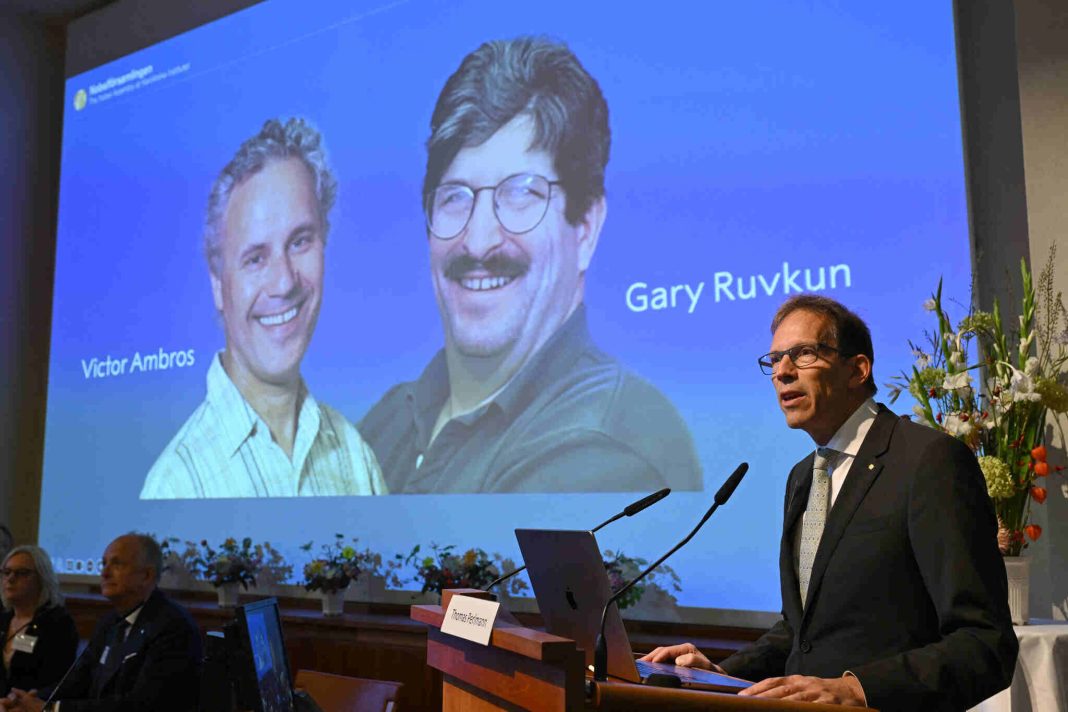Victor Ambros and Gary Ruvkun were awarded the Nobel Prize in Physiology or Medicine for their discovery of microRNA, a tiny class of RNA molecules that play a key role in determining how organisms develop and function. Their groundbreaking research, conducted with the roundworm species Caenorhabditis elegans, revealed a new principle of gene regulation essential to the health and development of multicellular organisms, including humans.
Dr. Ambros is a professor of natural science at the University of Massachusetts Chan Medical School, while Dr. Ruvkun is a professor of genetics at Harvard Medical School and a researcher at Massachusetts General Hospital. Their discovery has significant implications, as gene regulation controls the differences between various cell types. If gene regulation goes awry, it can result in diseases such as cancer, diabetes, or autoimmune disorders. The Nobel committee noted that the human genome contains instructions for over 1,000 types of microRNA, opening new possibilities for disease treatment.
MicroRNA-based treatments are currently in clinical trials for heart disease, cancer, and neurodegenerative disorders. Jon Lorsch, director of the National Institute of General Medical Sciences, emphasized that the discovery has transformed our understanding of disease processes, enabling new strategies for disease prevention and treatment.
In addition to the scientific achievement, the Nobel committee’s selection was praised for highlighting collaboration between Ambros and Ruvkun, who were based at different institutions. Geraldine Seydoux, a biologist, celebrated the award as a recognition of curiosity-driven science and the friendship and cooperation between the two laureates.
The RNA molecule, often described as the messenger that carries instructions from DNA to cells for protein production, plays a central role in biology. However, Ambros and Ruvkun’s findings suggested that the process was far more intricate than previously thought. Their research showed that microRNA acts as a “controller” of RNA, regulating when protein production should slow down or stop. This regulation is vital because too much or too little protein production can lead to diseases like cancer or osteoporosis.
Although Ambros and Ruvkun did not initially set out to challenge the central dogma of molecular biology, their research into the roundworm C. elegans led to the unexpected discovery. Roundworms are commonly used in basic research due to their simplicity and transparency, which allows scientists to observe cell development in real-time. The duo was investigating why some roundworms developed a specific genetic mutation, a topic that seemed distant from human health at the time.
Ambros and Ruvkun’s collaboration started with a competitive edge, as they had been postdoctoral fellows together at MIT before starting their own labs in Boston. However, once they realized that their findings overlapped—Ambros’s microRNA discovery matched the larger RNA molecule Ruvkun was studying—the competition faded, and the two scientists began working together closely.
Their research revealed that microRNA is much smaller than typical RNA, consisting of just a few dozen building blocks compared to the hundreds or thousands found in larger RNA strands. They demonstrated that microRNA regulates protein production by binding to larger RNA strands, controlling the process in a way that can affect everything from development to disease.
The initial discovery was published in two papers in the journal Cell in 1993 but was met with little fanfare. Many scientists believed that the process was unique to roundworms and not applicable to more complex organisms like humans. However, years later, Ruvkun found evidence that the gene responsible for microRNA in roundworms also existed in humans, indicating that this regulatory mechanism was present across the animal kingdom.
This breakthrough paved the way for further research into how microRNA controls gene expression in humans, leading to advances in the understanding of diseases caused by gene regulation errors. Ambros and Ruvkun’s discovery has had a profound impact on the field of molecular biology, and their collaboration serves as a reminder of the importance of curiosity-driven research and the value of public funding in scientific progress.
The Nobel committee’s recognition of their work highlights the significance of studying simple organisms like roundworms to uncover complex biological processes that can lead to life-changing discoveries in human health.

